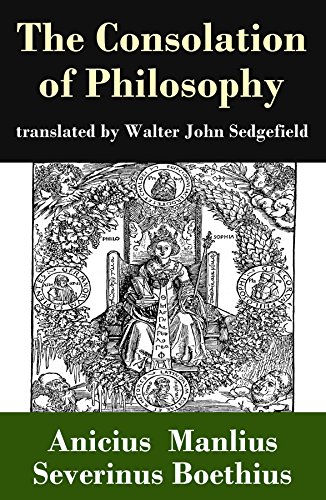The Consolation of Philosophy (translated by Walter John Sedgefield)
Anicius Manlius Severinus Boethius
BOOK REVIEW

The Consolation of Philosophy by Anicius Manlius Severinus Boethius is not just a philosophical treatise; it's a profound echo of the human experience, a timeless call to arms for anyone grappling with despair. Wrapped in the tragic currents of 6th-century Rome, Boethius, a philosopher caught in the throes of political upheaval, invites you to explore the turbulent landscapes of the soul. Amidst his tumult, he crafts a masterpiece that resonates through the ages, offering solace through reason and contemplation. 🌪
Set against the backdrop of his imprisonment, the narrative unfolds as a dialogue between the author and Lady Philosophy, an ethereal presence who bestows wisdom upon his troubled mind. Here, readers encounter a rich tapestry woven with threads of Stoicism, Neoplatonism, and Christian thought. Boethius daringly challenges the notion of fortune and the fleeting nature of worldly success, echoing the sentiment that true happiness transcends the caprices of fate. This exploration isn't merely academic; it's an emotional journey that compels you to confront your own perceptions of happiness and suffering.
As you delve into The Consolation of Philosophy, you might feel the weight of each word resonate in your chest, urging you to reflect on your life's tribulations. When Boethius laments his misfortunes, he embodies the universal struggle against despair, making this work not only relevant but vital for contemporary readers. His insights pierce through the veil of time, exposing the raw emotions that bind us all-the fear of loss, the quest for meaning, and the yearning for peace in a chaotic world.
Readers' responses to this pivotal work are as diverse as the themes it explores. Many have lauded it as a beacon of hope, praising its ability to cultivate resilience in the face of adversity. Critics, however, have pointed to Boethius's reliance on philosophical abstraction, arguing that it may alienate those seeking concrete solutions to their pain. Yet, this very tension-the clash between rigorous thought and human emotion-is what amplifies the book's impact. It's an exercise in balance, compelling you to navigate the delicate interplay between logic and feeling.
Boethius draws from the well of classical philosophy, but is not merely a relayer of ideas. His contributions influenced a cadre of thinkers, from medieval scholars to Enlightenment philosophers. It's mind-boggling to consider: without Boethius, who knows how the conversation around fate and free will might have unfolded in the Western canon?
Imagine the minds he shaped-Thomas Aquinas, Dante Alighieri, Frederick Nietzsche-who grappled with the ideas he laid forth. They danced between despair and elevation, just as Boethius did, transforming pain into philosophical insight. He asks: How do you reconcile a world where good people suffer while the wicked prosper? Through his lens, you are urged not to seek answers through mere chance, but rather, to understand a deeper form of justice that transcends mere mortal evaluation.
Philosophy, in Boethius's view, becomes your steadfast companion in times of hardship. The words leap from the pages, almost audibly whispering that you're not alone in your struggles. They serve as a reminder that contemplation itself can be a form of solace, a conduit to peace that crushes the chains of despair. As you read, the dialogue between Boethius and Lady Philosophy acts as a mirror, reflecting your vulnerabilities and illuminating paths towards clarity and strength.
The Consolation of Philosophy will leave you with more than just knowledge; it will shatter your complacency and ignite a fire of introspection. It dares you to dig deep within your psyche, compelling you to confront uncomfortable truths about your existence. Whether you're wrestling with feelings of inadequacy, or simply seeking a thoughtful companion to guide you through life's tumult, this work is your lifeline-a philosophical life raft in the stormy sea of human emotion.
In a world fixated on material success, Boethius's wisdom resonates with an urgent, poetic clarity: true peace is a state crafted from within, untouched by external forces. So, take the plunge into The Consolation of Philosophy, and discover how this ancient text can speak to your modern spirit-infusing your life with purpose, and leading you toward a deeper understanding of your own existence. 💫
📖 The Consolation of Philosophy (translated by Walter John Sedgefield)
✍ by Anicius Manlius Severinus Boethius
🧾 167 pages
2013
#consolation #philosophy #translated #walter #john #sedgefield #anicius #manlius #severinus #boethius #AniciusManliusSeverinusBoethius